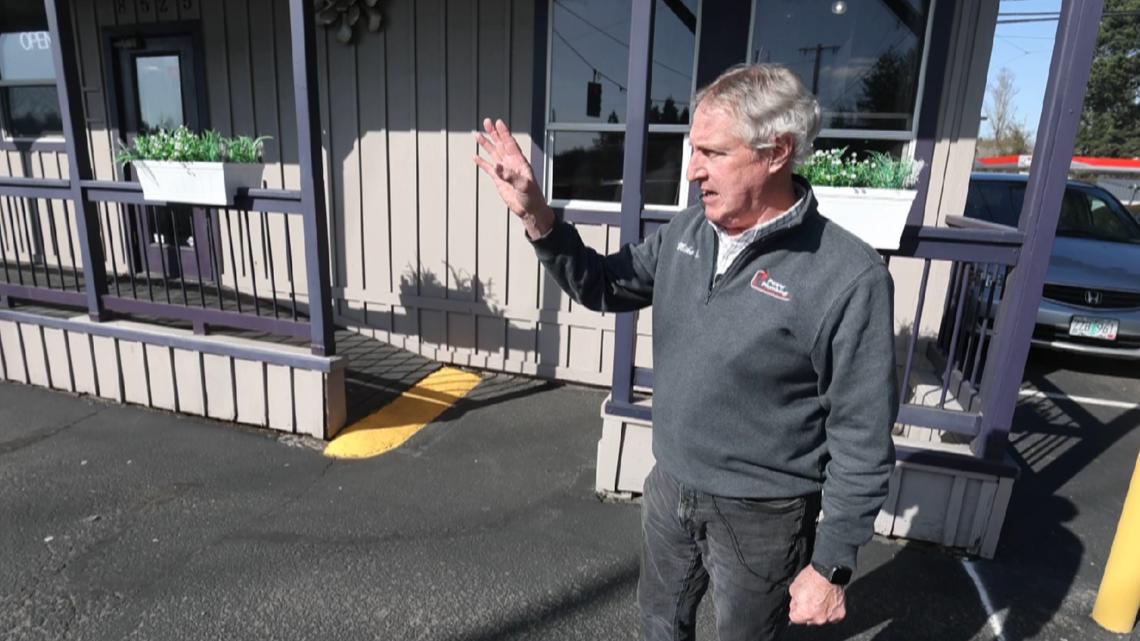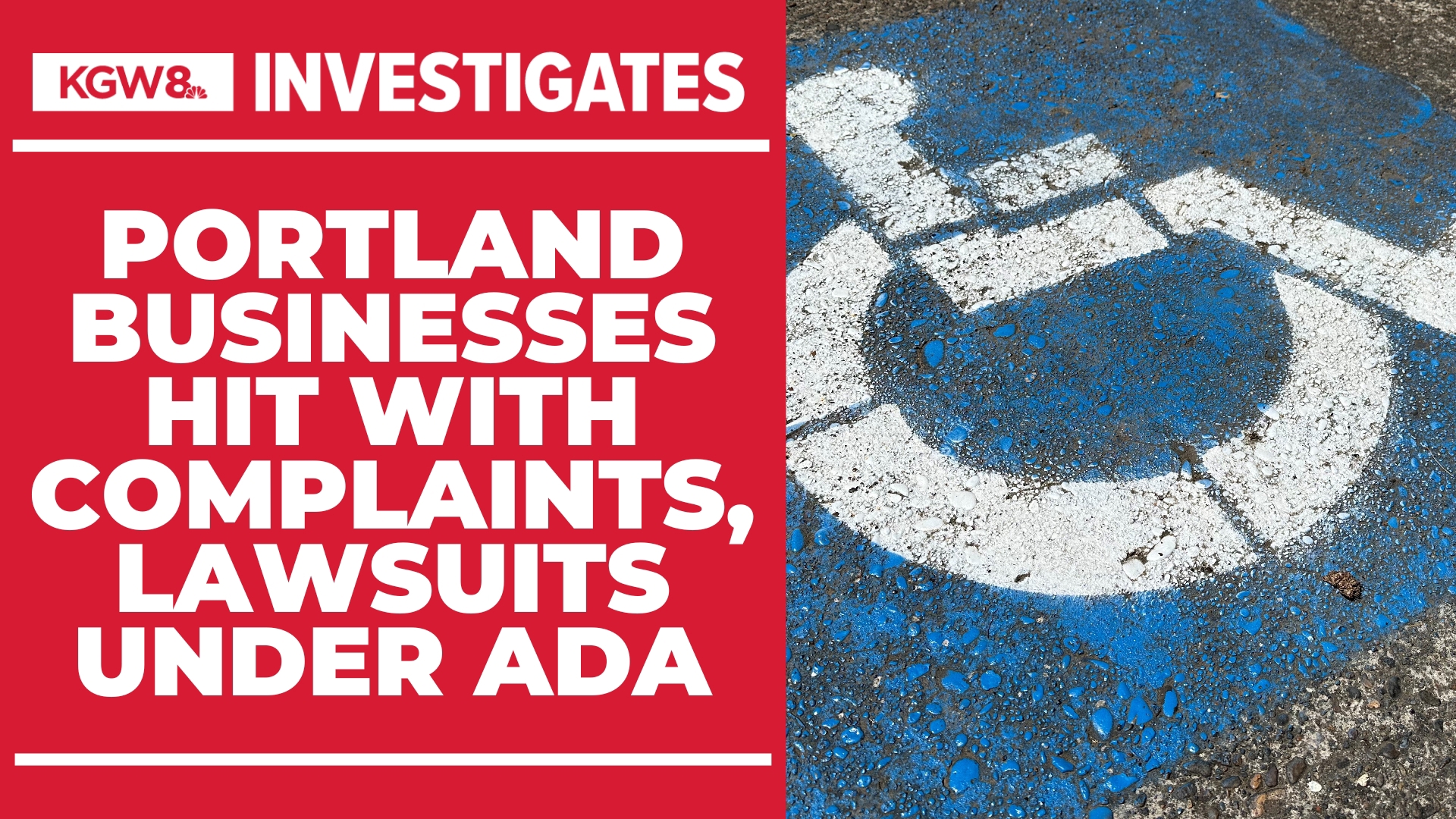PORTLAND, Oregon — With a ramp to the front entrance and well-marked parking spaces, the small commercial building Mike Davis owns in Southwest Portland looked like it was compliant with the Americans with Disabilities Act. It wasn’t.
The property was in violation, Davis explained. The ramp was too steep and there was no van-accessible parking.
Davis, who has owned the building for years, just learned about the ADA issues in January. He didn't learn it from a customer visiting the hair salon housed in the building — instead, he was served a demand letter from a Portland attorney who proposed a settlement agreement. The lawyer said he wouldn’t sue if Davis agreed to bring the property into compliance with the ADA and pay attorney’s fees.
“I couldn’t have been any more blindsided,” Davis said.
And the clock was ticking. The lawyer wanted a deal within two weeks, and payment of $10,000 in attorney’s fees, according to Davis.
“It seems like it is extortion. That’s the way I look at it,” Davis explained.


It turns out that this same Portland lawyer, David Foster, and another lawyer named Jessica Molligan, have sued more than 35 small businesses in the Portland area since September. These convenience stores, restaurants and gas stations are accused of violating some technical aspects of the ADA. The most common issue involved a lack of van-accessible parking spaces. The dimensions must be exact, painted and marked with a sign.
Many of the targeted business owners who spoke with KGW had no idea they’d done anything wrong.
“My dad’s been a property owner for 20-plus years, and we’ve never had a customer complaint about ADA issues,” said Doug Hwang, whose father received a demand letter. It also included a demand that attorney’s fees be paid.
“If they had said, ‘These are all the things wrong. Please fix them on behalf of the ADA community,’ we would have done it, no problem,” explained Hwang. “Instead, it feels like it’s very much about money.”
Some small businesses felt targeted because they have limited means to defend themselves.
“Any lawsuit can get to $50,000 or $60,000 with attorney’s fees in the snap of a finger, so I think your better way is just to pay them,” Davis said.
The demand letters and lawsuits are mostly boilerplate. They use the same language and name the same three clients. Both attorneys refused KGW's request for an on-camera interview.
In a written statement, Foster said, “despite being on notice of the ADA and its requirements for decades, commercial property owners and businesses in this area have continued to discriminate against disabled individuals.”
'Businesses want to do the right thing'
The ADA is the 1990 federal law that protects the rights of people with disabilities. Title III of the ADA requires that all businesses open to the public must be accessible — meaning they must provide people with disabilities an equal opportunity to access the goods or services they offer. If businesses don’t comply, they can be sued without warning.
New construction must be built according to the ADA’s standards. Buildings constructed before 1991 must remove existing barriers when it would be readily achievable.
“There is no government agency to enforce this law, and sadly, the burden falls on paraplegics and quadriplegics to enforce the ADA,” wrote Molligan, the other attorney who has produced these demand letters.
In the United States, one in four people lives with some form of disability. Many face significant barriers in getting through their daily lives.
“Business owners should take proactive steps to ensure that individuals with disabilities can access their establishments,” said Tom Stenson, deputy legal director for Disability Rights Oregon.
Tiana Tozer is a longtime advocate for people with disabilities, and she recently took part in a lawsuit against the city of Portland over sidewalk accessibility, which has been heavily impacted by the proliferation of homeless camps.
Despite being an advocate for the enforcement of ADA standards, Tozer argues that blindsiding small businesses with a lawsuit — then tacking on attorneys’ fees — is the wrong strategy.
“I think businesses want to do the right thing. And I think people with disabilities should give them the opportunity to do the right thing and only use lawsuits as a last resort,” explained Tozer. “It’s my hope that this won’t reflect poorly on people with disabilities.”


An uptick in ADA suits
Litigation against businesses accused of violating the ADA has risen sharply in Oregon. In 2023, federal court records showed 26 ADA cases filed against businesses in Oregon, not related to employment. In 2013, there were just seven ADA cases.
Since September, attorneys Foster and Molligan have filed more than 35 ADA lawsuits against businesses in the Portland area. That does not reflect the total number of demand letters sent, where attorney’s fees may have been paid as part of a settlement to avoid litigation.
Several small business owners who settled ADA cases after receiving demand letters from Foster or Molligan told KGW that they were required to sign a non-disclosure agreement, keeping them silent about the settlement and how much was paid in attorney’s fees.
Foster and Molligan rely on three plaintiffs to make their claims: Conner Slevin, Justin Burley-Beavers and Nadia Roberts are each named in separate lawsuits. The plaintiffs are all people with disabilities who claim to have encountered accessibility issues while visiting businesses. It is not clear if the plaintiffs are compensated for their involvement.
“I firmly see myself as an advocate for myself and others similarly situated that have been deterred from entering businesses based on the lack of ADA appropriate accommodations,” Roberts said in a statement provided through her attorney.
“I have no agenda when I decide on what properties I will visit other than that they are apparently in violation of the ADA and that they are in close proximity to other similar properties, because of the difficulties getting around the city by wheelchair poses,” explained Roberts.
Slevin and Burley-Beavers, who have both been featured in previous news stories, did not respond to KGW's request for comment.
In the end, Davis agreed to make the changes to his building in Southwest Portland. His lawyer is working to negotiate a settlement. He fixed the ramp, rearranged the entry and created van-accessible parking, along with a sign.
Davis didn’t mind making the changes, which lead to improved access. He just didn’t like how the lawyer went about it.
“It leaves me with a real bad taste in my mouth,” said Davis.
Are you a business or property owner in Oregon who has received a demand letter or lawsuit involving ADA violations? If so, we’d like to hear from you. Please fill out this form.

